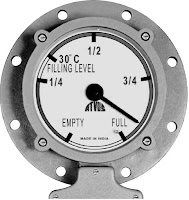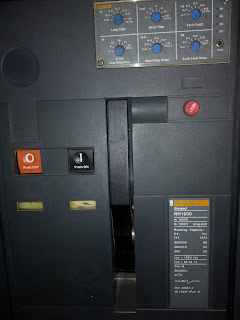PROTECTIVE RELAY
Classification of Protective Relays :
- Based on Technology :
 |
| Induction Disc type Relay |
- Relay consists of 2 Electromagnets , Disc , Moving contact and fixed contact , plug setting multiplier . 2 Windings are connected to 2 electromagnets.
- The Primary current carries Current in E shaped electromagnet causes Emf in secondary due to mutual induction and it creates flux on secondary , in total two fluxes created in relay , the difference in flux makes the driving torque to rotate the disc & complete it revolution and comes in contact to trip signal to give tripping signal to breaker if current is more than specified limit .
- PSM Settings indicates severity of faults , Relay current settings can be made by PSM , the Relay operates based on fault current reaching the Plug settings value .
- TSM ( Time setting Multiplier) Adjusting the time at which relay should trip during Fault Condition , Whether to have Time delay or Instantaneous Trip the breaker in case of Fault Occurrence .
- For O/C , E/F , S/C Faults this Relay is used .
1.2 INDUCTION PLUNGER Type Relay :

- This Relay Works on same Electro- magnetic Principle Attracted Armature Type.
- Voltage Operated Relay with Attracted Armature Type .
 |
| Transformer Auxiliary Relays |
 |
| Auxiliary Relay |
- Plunger type Relays used as Auxiliary Relays for Transformer Buchholz Alarm , Winding temperature .
- Used in Alarm, Control, Indication and other Auxiliary Applications
Advantages & Disadvantages of Electro - Magnetic Relay:
- Simple , Robust , Cost effective .
- No Solid state or Semiconductor devices , no heat losses.
Disadvantage :
- Limited Lifetime
- Wear & Tear due to Mechanical components present .
- slow , sluggish operation .
- no monitoring of parameters available .
- Limited Lifetime
- Wear & Tear due to Mechanical components present .
- slow , sluggish operation .
- no monitoring of parameters available .
NOTE: Electro - Magnetic Relay are AGE Old Technology Relay which are used in old Industries & Commercial Buildings . (We can Still find these relays functional in Commercial buildings which are being operated since year 2008 to 2020 ).
Now if these relays are failed they are replaced with advanced Relays like Numerical & microprocessor Based Relays.
2. Solid State Static Relays :
- Solid state Electronic Devices are added to this Relay , no moving part is present in this relay.
- It works Potentially indefinite & more Efficient .
- Only Static Components like Electronic & Magnetic circuits are present .
- It has Components like Rectifier , Relay measuring circuit, Amplifier & trip circuit , comparators , level detectors .
- Solid State Relays are used for Overcurrent , Earth Fault or Earth leakage current Relays in LV side and Current Balance Relay used in HT side .
Advantages & Disadvantages of Static Relay:
- Quick Response, Long life , highly Reliable
- Consumes Less Power , No thermal storage required.
Disadvantages :
- Relay affected by Voltage surges ,
- More costly than Electromagnetic type
- performance depends on electronic components.
- Relay affected by Voltage surges ,
- More costly than Electromagnetic type
- performance depends on electronic components.
3. Numerical Relay :
- Big Difference Between Numerical Relay & other Relays is wiring , Wiring in electromagnetic & Static relay are fixed where as in Numerical Relay are Programmable relays which can be programmable .
- Multifunctional , Display Parameters
- Storage of Data
- Microcontroller Based Numerical Relay .
- Overcurrent , Earth fault Protection
- parts of relay are i/p module , cpu, memory , D/A converter and A/D converter , O/p module .
- Relay operates based on Mathematical & logical operations will trip based on parameters.
- The Above Relays are Presently Used in Market .
- Multifunctional helpful in measuring all Electrical Parameters.
- The Above Relays are Presently Used in Market .
- Multifunctional helpful in measuring all Electrical Parameters.
Advantages & Disadvantages of Numerical Relay:
- Most Advanced Relay.
- Monitor of Power System Parameters.
- Quick Response, more sensitive to Fault currents
- Most accurate , Compact, flexible.
- Multifunctional, Data storage , Data history
Disadvantage :
- Complex Design, costly
- Interference .
4. Micro- Processor Based Relay :












Comments
Post a Comment